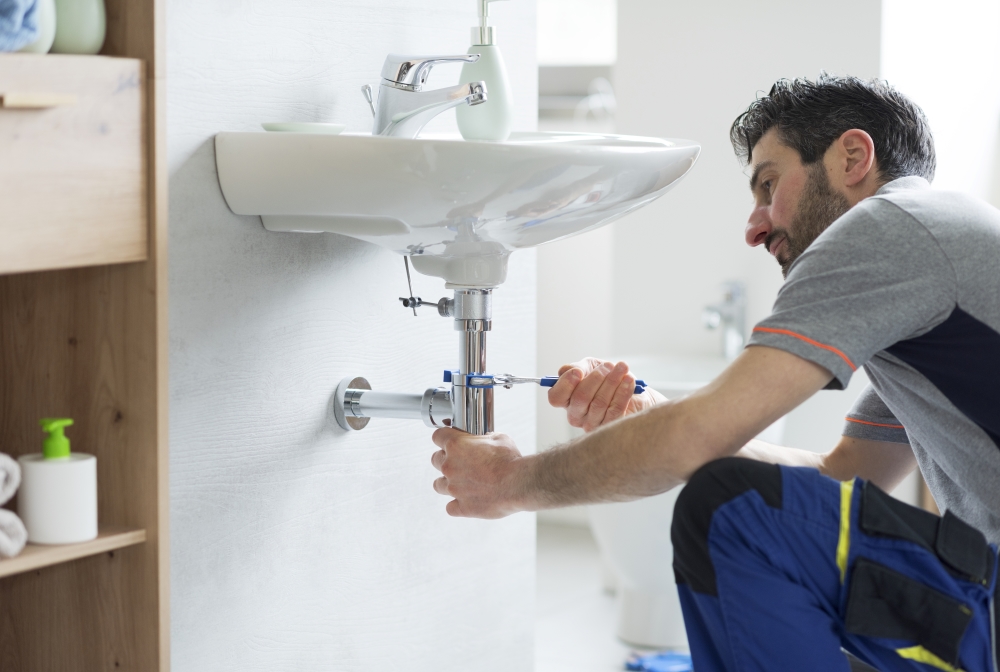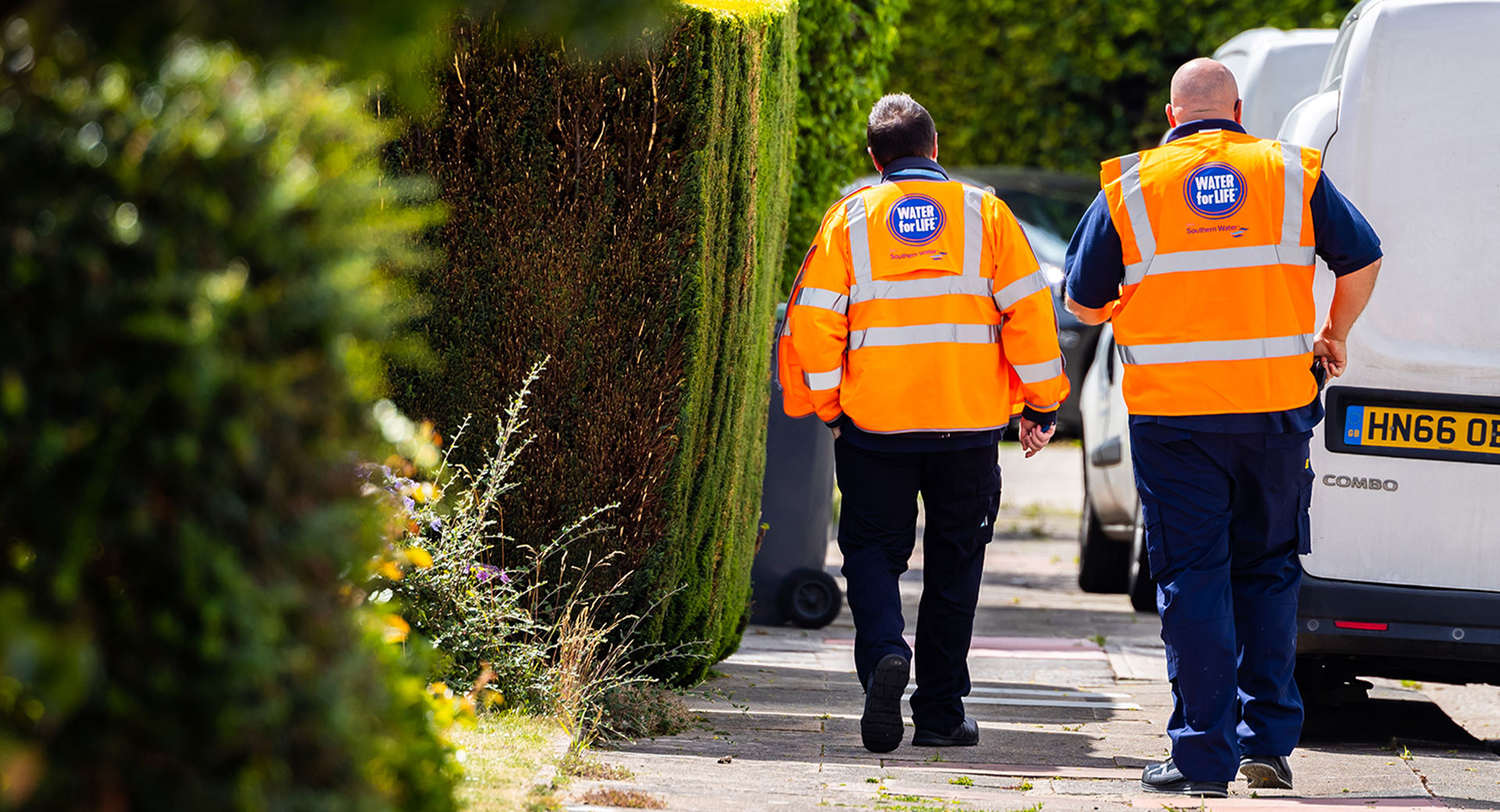
Our water visit
If there’s a problem with your water supply, we’ll do everything we can to investigate and get it fixed as quickly as possible. Learn more about the steps we take to put things right.
What happens when we visit?
Learn more about the steps we’ll take if there’s a problem with your water supply and how we’ll carry out repairs if needed.

Reporting a problem
Once you've reported a problem, we'll give you a job reference number (we’ll text it too). One of our Water Network Inspectors will come out or do a quick video call with you, to help us understand the issue.

Investigation
An inspector will aim to assess the problem within 2 hours for emergencies, 24 hours for urgent issues, and 5–10 working days for smaller non-urgent issues — sooner if we can. They’ll arrange any repairs and leave a blue calling card with their findings. Blue markings on the ground are to guide our engineers — don’t worry, they’ll fade.

Planning the repair
If a repair is needed, our partner Clancy will plan the work. We need to consider safety, traffic management, permission from the local council (if road closures are needed, they can take up to 90 days to approve —we can’t start work until they do). In emergencies, we’re allowed to start repairs straightaway.

Repairs
Once we’ve got permits, Clancy will get started. Repairs can take up to 28 days depending on how serious or complex the issue is. We may need to temporarily turn off your water to complete the work, but don’t worry — as soon as finished, we’ll get it back on. We’ll leave you a green calling card to explain what's been done.

After the repair
We sometimes lay a temporary surface to make the area safe and allow the ground to settle — before we come back to properly restore the surface. We’ll look to get things back to normal as soon as possible but can take up to 6 months (if it’s a non-standard surface or needs special equipment or further permits).
Your water calling card explained
We tick the relevant boxes on your blue or green calling card to show what we checked, what we found, what we did and what happens next. Unsure what it all means? Find out below.
If you live near one of our sites or an area where we’re working, we may have visited to let you know about what we’re doing and may kindly ask you to move any vehicles stopping us from completing the work. We always try to finish the job before we leave but sometimes more work may be needed if:
- the problem is more complex and further work is required – we’ll let you know and give you an estimated timeframe of when we expect to return
- we need to apply to the local Highways Agency for permission to dig up a road – this might delay us from starting work immediately
- we need to check all the local pipework – this can take time if we need to get on to someone’s land or property but the owners aren’t home to give their permission.

Incomplete or temporary work
We sometimes leave barriers or path boards during temporary and permanent reinstatement to allow the work to dry or settle. A temporary reinstatement is a temporary and safe fix for the area, often following a flooding, a leak or excavation work. We may not use the same material as before so things may appear different. We'll make sure everything will be fixed and left neat and tidy when we return to finish the job.
As well as waiting for the ground to settle, we may need to apply for permits or bring in specialist equipment to complete the work. This may take up to six months and any temporary repairs we do will last this long. All our work meets the standards set by the local Highways Authority.
If we've been working near your home, there’s no need to contact us, we will be returning to complete the work.
Your water meter
We use your meter to track how much water you use and calculate your bill. Even if it’s on private land, we’re responsible for maintaining it. Find out more about your water meter.
Your external stop tap
This turns off your water if your internal stop tap fails or in emergencies like a burst pipe. It’s usually under a cover outside your home — on a path, driveway or verge. For plumbing and renovation work inside your home, use your internal stop tap instead. Find out more about your stop taps.
You (or your landlord) are responsible for the pipe that connects your home to our water main — including fixing leaks. If it crosses someone else’s land, you’ll need their permission to carry out any repairs. Some supply pipes are shared between properties and so it's the responsibility of all owners to repair and maintain it. Some home insurance polices cover supply pipes.
Your questions answered
What if there’s a leak on my pipe?
Leaks can be caused by ground movement or freezing temperatures. They can waste a lot of water and if you’re on a meter, this will increase your bill.
If the leak is on your supply pipe and you repair it within 30 days, you can apply for a one-off leak allowance (credit on a future bill) for the water lost and the increase in your bill. This will not be available if:
- the leak happened because of faulty pipes or fixture/fittings inside your property
- you or someone else living with you caused the leak through negligence
- you knew, or could reasonably be expected to have known, that there was a leak and you failed to repair it.
Once your leak is repaired, please call 0330 303 0277 to see if you qualify for a leakage allowance.
If you’re on our Priority Services Register or support tariffs, we may be able to help with leak repairs. Call us to find out more.
What if I have low pressure?
Water pressure can drop during busy times when people are using more water. Pressure may also vary depending on how far you are to our reservoir or water tower. Find out what to do if you have low water pressure.
My water looks unusual?
If your supply was interrupted, your water may contain air or look, smell or taste unusual. Try running your cold kitchen tap slowly and it should return to normal. If this hasn’t helped, call 0330 303 0368 or our accessible Minicom service on 0330 303 1265.
We maintain the water mains that supply your area. We may be outside your home fixing a leak on our pipe or checking for one – this won’t affect your bill.
We may also be replacing older pipes to prevent future leaks and bursts. If we’re working on our pipes outside your home, it’s with permission from the local Highways Authority who own public roads, pavements and kerbs. We’ll knock on your door to let you know what we’re doing.
Your questions answered
Why do leaks happen and how do you fix them?
Leaks can be caused by weather, pressure surges or ageing pipes. We’re cutting leakage in half by replacing aging mains, managing pressure across our network, and using the latest technology to find and fix leaks fast. If we can’t fix it straight away, we’ll return.
What does a noisy pipe mean?
The sound of our pipes can give us an idea of how healthy they are. If you notice noisy pipes, this may mean there’s a leak. Our Leakage team use special equipment to listen for issues, and we’ve installed acoustic loggers across our network to detect any changes in sounds. If we hear something unusual, we’ll send someone out to investigate.
You may also be interested in...
Did you find the information you are looking for?







